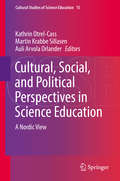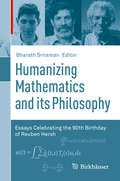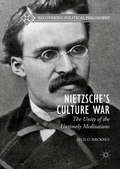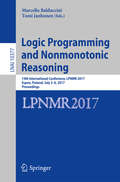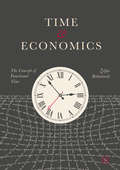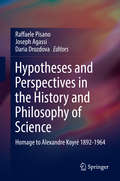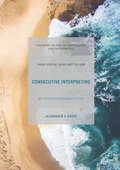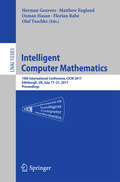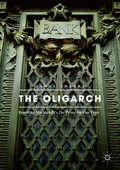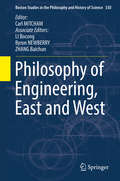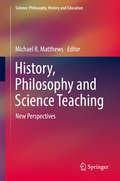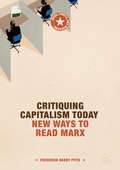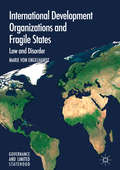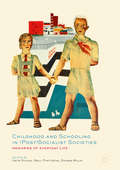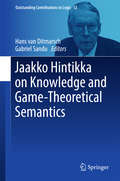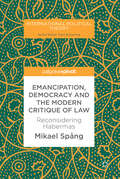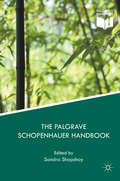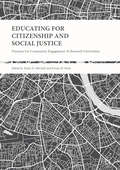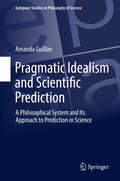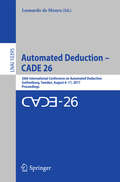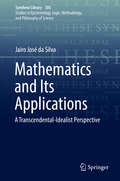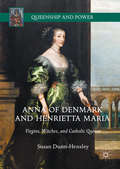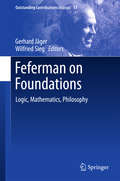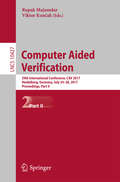- Table View
- List View
Cultural, Social, and Political Perspectives in Science Education: A Nordic View (Cultural Studies of Science Education #15)
by Kathrin Otrel-Cass Martin Krabbe Sillasen Auli Arvola OrlanderThis book presents a collection of critical thinking that concern cultural, social and political issues for science education in the Nordic countries. The chapter authors describe specific scenarios to challenge persisting views, interrogate frameworks and trouble contemporary approaches to researching teaching and learning in science. Taking a point of departure in empirical examples from the Nordic countries the collection of work is taking a critical sideways glance at the Nordic education principles. Critical examinations target specifically those who are researching in the fields of science education research to question whether conventional research approaches, foci and theoretical approaches are sufficient in a world of science education that is neither politically neutral, nor free of cultural values. Attention is not only on the individual learner but on the cultural, social and political conditions and contexts in science education. The different chapters review debates and research in teacher education, school teaching and learning including when external stakeholders are involved. Even though the chapters are contextualized in Nordic settings there will be similarities and parallels that will be informative to the international science education research community.
Humanizing Mathematics and its Philosophy
by Bharath SriramanThis Festschrift contains numerous colorful and eclectic essays from well-known mathematicians, philosophers, logicians, and linguists celebrating the 90th birthday of Reuben Hersh. The essays offer, in part, attempts to answer the following questions set forth by Reuben himself as a focus for this volume: Can practicing mathematicians, as such, contribute anything to the philosophy of math? Can or should philosophers of math, as such, say anything to practicing mathematicians? Twenty or fifty years from now, what will be similar, and what will, or could, or should be altogether different: About the philosophy of math? About math education? About math research institutions? About data processing and scientific computing? The essays also offer glimpses into Reuben's fertile mind and his lasting influence on the mathematical community, as well as revealing the diverse roots, obstacles and philosophical dispositions that characterize the working lives of mathematicians. With contributions from a veritable "who's who" list of 20th century luminaries from mathematics and philosophy, as well as from Reuben himself, this volume will appeal to a wide variety of readers from curious undergraduates to prominent mathematicians.
Producing History in Spanish Civil War Exhumations: From the Archive to the Grave (World Histories of Crime, Culture and Violence)
by Zahira Aragüete-ToribioThis book reflects on the new histories emerging from the exhumation of mass graves that contain the corpses of the Republicans killed in extrajudicial executions during and after the conflict, nearly eighty years after the end of the Spanish Civil War (1936-1939). In the search for, location and unearthing of these unmarked burials, the corpse, the document and the oral testimony have become key traces through which to demand the recognition of past Francoist crimes, which were never atoned, from a lukewarm Spanish state and judiciary. These have become objects of evidence against the politics of silence entertained by national institutions since the transition to democracy. Working alongside archaeologists, historians, memory activists and families, this book explores how new versions of the history of the killings are constructed at the cross-roads between science, history and family experience. It does so considering the workings of truth-seeking in the absence of criminal justice and the effects of the process on Spanish collective memory and identity.
Nietzsche’s Culture War
by Shilo BrooksThis book is the first comprehensive interpretation of Nietzsche's Untimely Meditations. It argues that the four Meditations--which Nietzsche said "deserve the greatest attention for my development"--are not separate pieces, but instead form a unified philosophic narrative that constitutes his first attempt to diagnose and cure the spiritual ailments whose causes he traced to modern culture and science. Taking Nietzsche's commentary on the four essays in his autobiographical work Ecce Homo as its interpretive guide, this book also shows that the Untimely Meditations contain early expositions of concepts like the last man, the overman, the new philosopher, the creation of values, and the malleability of nature--all staples of his later philosophy.
Logic Programming and Nonmonotonic Reasoning
by Marcello Balduccini Tomi JanhunenThis Festschrift volume, published in honor of Michael Gelfond on the occasion of his 65th birthday, contains a collection of papers written by his closest friends and colleagues. Several of these papers were presented during the Symposium on Constructive Mathematics in Computer Science, held in Lexington, KY, USA on October 25-26, 2010. The 27 scientific papers included in the book focus on answer set programming. The papers are organized in sections named "Foundations: ASP and Theories of LP, KR, and NMR", "ASP and Dynamic Domains", and "ASP - Applications and Tools".
Time and Economics: The Concept of Functional Time
by Željko RohatinskiThis book links the philosophical perception of time and Einstein’s theory of special relativity to economic processes, showing that the phenomena of time dilation and length contraction seen in physics can be identified within – and adapted to – an economic framework. The author expands on Marx’s model of reproduction with the additional variable of time, which is represented as a relative or functional category. In addition to allowing a more precise understanding of both static and dynamic relations between economic systems, this concept examines approaches to time proposed by Smith, Marshall and Keynes, and challenges the equilibrium and disequilibrium economic models. Rohatinski suggests that by understanding the differences in economic activity perceived across different time periods we are better able to influence that activity at micro- and macroeconomic levels.
Hypotheses and Perspectives in the History and Philosophy of Science
by Joseph Agassi Raffaele Pisano Daria DrozdovaTo commemorate the 50th anniversary of his passing (in 2014), this special book features studies on Alexandre Koyr#65533; (1892-1964), one of the most influential historians of science of the 20th century, who re-evaluated prevalent thinking on the history and philosophy of science. In particular, it explores Koyr#65533;'s intellectual matrix and heritage within interdisciplinary fields of historical, epistemological and philosophical scientific thought. Koyr#65533; is rightly noted as both a versatile historian on the birth and development of modern science and for his interest in philosophical questions on the nature of scientific knowledge. In the 1940s and 1950s his activities in the United States established a crucial bridge between the European historical tradition of science studies and the American academic environments, and an entire generation of historians of science grew up under his direct influence. The book brings together contributions from leading experts in the field, and offers much-needed insights into the subject from historical, nature of science, and philosophical perspectives. It provides an absorbing and revealing read for historians, philosophers and scientists alike.
Consecutive Interpreting
by Alexander V. KozinThis book sheds light on the phenomenon of consecutive interpreting. It combines phenomenological and empirical analyses to build a communication theory of interpreting. The author begins by reviewing mainstream research on consecutive interpreting and then dissociates himself from it, conducting a three-tier analysis of interpreting data. He concludes by presenting an alternative theory of consecutive interpreting. As he makes clear from the outset, a new and combined methodology for consecutive interpreting needs to be constructed to satisfy both the relation of the phenomenon to experience as well as its social foundation. He also stresses the potential within the humanities for wider employment of the phenomenological empirical method. This book will appeal to students and scholars of linguistics, translation, phenomenology, social interaction and communication
Intelligent Computer Mathematics
by Herman Geuvers Florian Rabe Matthew England Osman Hasan Olaf TeschkeThis book constitutes the joint refereed proceedings of three international events, namely the 18th Symposium on the Integration of Symbolic Computation and Mechanized Reasoning, Calculemus 2011, the 10th International Conference on Mathematical Knowledge Management, MKM 2011, and a new track on Systems and Projects descriptions that span both the Calculemus and MKM topics, all held in Bertinoro, Italy, in July 2011. All 51 submissions passed through a rigorous review process. A total of 15 papers were submitted to Calculemus, of which 9 were accepted. Systems and Projects track 2011 there have been 12 papers selected out of 14 submissions while MKM 2011 received 22 submissions, of which 9 were accepted for presentation and publication. The events focused on the use of AI techniques within symbolic computation and the application of symbolic computation to AI problem solving; the combination of computer algebra systems and automated deduction systems; and mathematical knowledge management, respectively.
The Oligarch: Rewriting Machiavelli’s The Prince for Our Time
by James SherryThis book uses the structure of Machiavelli’s The Prince to show how governance has changed over the last 500 years. If Machiavelli focuses on power concentrated in the hands of the republic or principalities, The Oligarch looks at how states and companies today function as oligarchies. Rather than dealing with the form of government, it addresses the operations and networks of governance for both states and corporations as a single set of common processes. The author links politics, ecology and literature, by using the literary device of appropriation to raise awareness of ecology and the overreach of powerful people, offering both wielders and critics of power a common ground based on how people in power actually conduct themselves.
Philosophy of Engineering, East and West
by Carl Mitcham Bocong Li Byron Newberry Baichun ZhangThis co-edited volume compares Chinese and Western experiences of engineering, technology, and development. In doing so, it builds a bridge between the East and West and advances a dialogue in the philosophy of engineering. Divided into three parts, the book starts with studies on epistemological and ontological issues, with a special focus on engineering design, creativity, management, feasibility, and sustainability. Part II considers relationships between the history and philosophy of engineering, and includes a general argument for the necessity of dialogue between history and philosophy. It continues with a general introduction to traditional Chinese attitudes toward engineering and technology, and philosophical case studies of the Chinese steel industry, railroads, and cybernetics in the Soviet Union. Part III focuses on engineering, ethics, and society, with chapters on engineering education and practice in China and the West. The book’s analyses of the interactions of science, engineering, ethics, politics, and policy in different societal contexts are of special interest. The volume as a whole marks a new stage in the emergence of the philosophy of engineering as a new regionalization of philosophy. This carefully edited interdisciplinary volume grew out of an international conference on the philosophy of engineering hosted by the University of the Chinese Academy of Sciences in Beijing. It includes 30 contributions by leading philosophers, social scientists, and engineers from Australia, China, Europe, and the United States.
History, Philosophy and Science Teaching
by Michael R. MatthewsProduced by the Ontario Institute for Studies in Education, this inaugural volume in a new series contains 17 articles (most previously published) by historians, philosophers, psychologists, natural scientists, and science educators who advocate the teaching of science from a broader view in order to improve students' perception of the discipline, increase the development of critical skills, and retain a greater number of students in the field. Annotation copyrighted by Book News, Inc. , Portland, OR
Critiquing Capitalism Today: New Ways to Read Marx (Marx, Engels, and Marxisms)
by Frederick Harry PittsThis book critically introduces and compares two of the most compelling contemporary schools of Marxist thought: the German Neue Marx-Lekture, or New Reading of Marx, and Italian postoperaismo. In so doing, it radically updates our understanding of the key categories of Marx's critique of political economy- including value, money, labour, class and crisis- in light of new and exciting theoretical developments. The New Reading of Marx reevaluates Marx's Capital in the shadow of the first-generation Frankfurt School, finding an increasing uptake in the Anglophone world. Postoperaismo reconceptualises Marx's work in the wake of the Grundrisse, its theories of immaterial labour and capitalist crisis finding growing favour beyond the radical fringe via recent bestsellers like Paul Mason's Postcapitalism. Drawing on the first to engage in a pathbreaking critique of the second at a time of peak interest in its optimistic prospectus, the book brings into critical dialogue important modern thinkers such as Michael Heinrich, Werner Bonefeld, and Antonio Negri. In so doing, Critiquing Capitalism Today serves as both an introduction to each of these radical reinterpretations of Marx's critique of political economy, and a contribution to continuing debates within and between these and other strands of contemporary Marxism. Advancing knowledge in the field by bridging recent scholarship with older material, including the works of Marx himself, Theodor Adorno and Alfred Sohn-Rethel, it relates theoretical disputes with their historical context in capitalist society itself, keeping an empirical focus that clarifies complex conceptual material for readers new to these cutting-edge currents of critical thought.
International Development Organizations and Fragile States
by Marie Von EngelhardtThis book addresses a conundrum for the international development community: The law of development cooperation poses major constraints on delivering aid where it is needed most. The existence of a state with an effective government is a basic condition for the transfer of aid, making development cooperation with 'fragile' nations particularly challenging. The author explores how international organizations like the World Bank have responded by adopting formal and informal rules to engage specifically with countries with weak or no governments. Von Engelhardt provides a critical analysis of the discourse on fragile states and how it has shaped the policy decision-making of international organizations. By demonstrating how perceptions of fragility can have significant consequences both in practice and in law, the work challenges conventional research that dismisses state fragility as a phenomenon beyond law. It also argues that the legal parameters for effective global policy play a crucial role, and offers a fresh approach to a topic that is central to international security and development.
Childhood and Schooling in (Post)Socialist Societies: Memories of Everyday Life
by Zsuzsa Millei Iveta Silova Nelli PiattoevaThis book explores childhood and schooling in late socialist societies by bringing into dialogue public narratives and personal memories that move beyond imaginaries of Cold War divisions between the East and West. Written by cultural insiders who were brought up and educated on the eastern side of the Iron Curtain - spanning from Central Europe to mainland Asia - the book offers insights into the diverse spaces of socialist childhoods interweaving with broader political, economic, and social life. These evocative memories explore the experiences of children in navigating state expectations to embody "model socialist citizens" and their mixed feelings of attachment, optimism, dullness, and alienation associated with participation in "building" socialist futures. Drawing on the research traditions of autobiography, autoethnography, and collective biography, the authors challenge what is often considered 'normal' and 'natural' in the historical accounts of socialist childhoods, and engage in (re)writing histories that open space for new knowledges and vast webs of interconnections to emerge. This book will be compelling reading for students and researchers working in education, sociology and history, particularly those within the interdisciplinary fields of childhood and area studies. 'The authors of this beautiful book are professional academics and intellectuals who grew up in different socialist countries. Exploring "socialist childhoods" in myriad ways, they draw on memories, and collective history, emotional insider knowledge and the measured perspective of an analyst. What emerges is life that was caught between real optimism and dullness, ethical commitments and ideological absurdities, selfless devotion to children and their treatment as a political resource. Such attention to detail and examination of the paradoxical nature of this time makes this collective effort not only timely but remarkably genuine. ' --Alexei Yurchak, University of California, USA
Jaakko Hintikka on Knowledge and Game-Theoretical Semantics
by Gabriel Sandu Hans Van DitmarschThis book focuses on the game-theoretical semantics and epistemic logic of Jaakko Hintikka. Hintikka was a prodigious and esteemed philosopher and logician, and his death in August 2015 was a huge loss to the philosophical community. This book, whose chapters have been in preparation for several years, is dedicated to the work of Jaako Hintikka, and to his memory. This edited volume consists of 23 contributions from leading logicians and philosophers, who discuss themes that span across the entire range of Hintikka's career. Semantic Representationalism, Logical Dialogues, Knowledge and Epistemic logic are among some of the topics covered in this book's chapters. The book should appeal to students, scholars and teachers who wish to explore the philosophy of Jaako Hintikka.
Emancipation, Democracy and the Modern Critique of Law: Reconsidering Habermas (International Political Theory)
by Mikael SpångThis book focuses on Jürgen Habermas’ theorising on law, rights and democracy in light of the modern critique of law. The latter tradition, which goes back to Hegel and Marx, has addressed the limitations of rights as vocabulary of emancipation and law as language of autonomy. Since Habermas claims that his reconstruction of private and public autonomy has an emancipatory aim, the author has chosen to discuss it in the context of the modern critique of law. More specifically, the study addresses the need to consider the dialectic of law, in which law is both a condition for emancipation and domination, when discussing what law and rights permit. It will appeal to students and scholars across the fields of political theory, law and legal criticism, as well as sociology and sociology of law.
The Palgrave Schopenhauer Handbook
by Sandra ShapshayThis comprehensive Handbook offers a leading-edge yet accessible guide to the most important facets of Arthur Schopenhauer's philosophical system, the last true system of German philosophy. Written by a diverse, international and interdisciplinary group of eminent and up-and-coming scholars, each of the 28 chapters in this Handbook includes an authoritative exposition of different viewpoints as well as arguing for a particular thesis. Authors also put Schopenhauer's ideas into historical context and connect them when possible to contemporary philosophy. Key features: Structured in six parts, addressing the development of Schopenhauer's system, his epistemology and metaphysics, aesthetics and philosophy of art, ethical and political thought, philosophy of religion and legacy in Britain, France, and the US. Special coverage of Schopenhauer's treatment of Judaism, Christianity, Vedic thought and Buddhism Attention to the relevance of Schopenhauer for contemporary metaphysics, metaethics and ethics in particular. The Palgrave Schopenhauer Handbook is an essential resource for scholars as well as advanced students of nineteenth-century philosophy. Researchers and graduate students in musicology, comparative literature, religious studies, English, French, history, and political science will find this guide to be a rigorous and refreshing Handbook to support their own explorations of Schopenhauer's thought.
Educating for Citizenship and Social Justice
by Krista M. Soria Tania D. MitchellIn this edited volume, authors explore the ways in which departments, programs, and centers at public research universities are working to better engage students in the work of citizenship and social justice. The chapters in this book illuminate the possibilities and challenges for developing community engagement experiences and provide evidence of the effects of these efforts on communities and undergraduate students' development of citizenship outcomes. This text reveals how important the integration of our intentions and actions are to create a community engaged practice aimed towards justice.
Pragmatic Idealism and Scientific Prediction
by Amanda GuillánThis monograph analyzes Nicholas Rescher’s system of pragmatic idealism. It also looks at his approach to prediction in science. Coverage highlights a prominent contribution to a central topic in the philosophy and methodology of science. The author offers a full characterization of Rescher’s system of philosophy. She presents readers with a comprehensive philosophico-methodological analysis of this important work. Her research takes into account different thematic realms: semantic, logical, epistemological, methodological, ontological, axiological, and ethical. The book features three, thematic-parts: I) General Coordinates, Semantic Features and Logical Components of Scientific Prediction; II) Predictive Knowledge and Predictive Processes in Rescher’s Methodological Pragmatism; and III) From Reality to Values: Ontological Features, Axiological Elements, and Ethical Aspects of Scientific Prediction. This insightful analysis offers a critical reconstruction of Rescher’s philosophy. The system he created is often characterized as pragmatic idealism that is open to some realist elements. He is a prominent representative of contemporary pragmatism who has made a great deal of contributions to the study of this topic. This area is crucial for science and it has been little considered in the philosophy of science.
Automated Deduction – CADE 26: 26th International Conference on Automated Deduction, Gothenburg, Sweden, August 6–11, 2017, Proceedings (Lecture Notes in Computer Science #10395)
by Leonardo MouraThis book constitutes the proceeding of the 26th International Conference on Automated Deduction, CADE-26, held in Gothenburg, Sweden, in August 2017. The 26 full papers and 5 system descriptions presented were carefully reviewed and selected from 69 submissions. CADE is the major forum for the presentation of research in all aspects of automated deduction, including foundations, applications, implementations and practical experience. The chapter 'Certifying Confluence of Quasi-Decreasing Strongly Deterministic Conditional Term Rewrite Systems' is published open access under a CC BY 4. 0 license.
Mathematics and Its Applications: A Transcendental-Idealist Perspective (Synthese Library #385)
by Jairo José da SilvaThis monograph offers a fresh perspective on the applicability of mathematics in science. It explores what mathematics must be so that its applications to the empirical world do not constitute a mystery. In the process, readers are presented with a new version of mathematical structuralism.The author details a philosophy of mathematics in which the problem of its applicability, particularly in physics, in all its forms can be explained and justified. Chapters cover: mathematics as a formal science, mathematical ontology: what does it mean to exist, mathematical structures: what are they and how do we know them, how different layers of mathematical structuring relate to each other and to perceptual structures, and how to use mathematics to find out how the world is.The book simultaneously develops along two lines, both inspired and enlightened by Edmund Husserl’s phenomenological philosophy. One line leads to the establishment of a particular version of mathematical structuralism, free of “naturalist” and empiricist bias. The other leads to a logical-epistemological explanation and justification of the applicability of mathematics carried out within a unique structuralist perspective. This second line points to the “unreasonable” effectiveness of mathematics in physics as a means of representation, a tool, and a source of not always logically justified but useful and effective heuristic strategies.
Anna of Denmark and Henrietta Maria: Virgins, Witches, and Catholic Queens (Queenship and Power)
by Susan Dunn-HensleyThis book examines how early Stuart queens navigated their roles as political players and artistic patrons in a culture deeply conflicted about the legitimacy of female authority. Anna of Denmark and Henrietta Maria both employed powerful female archetypes such as Amazons and the Virgin Mary in court performances. Susan Dunn-Hensley analyzes how darker images of usurping, contaminating women, epitomized by the witch, often merged with these celebratory depictions. By tracing these competing representations through the Jacobean and Caroline periods, Dunn-Hensley peels back layers of misogyny from historical scholarship and points to rich new lines of inquiry. Few have written about Anna's religious beliefs, and comparing her Catholicism with Henrietta Maria's illuminates the ways in which both women were politically subversive. This book offers an important corrective to centuries of negative representation, and contributes to a fuller understanding of the role of queenship in the English Civil War and the fall of the Stuart monarchy.
Feferman on Foundations: Logic, Mathematics, Philosophy (Outstanding Contributions To Logic Ser. #13)
by Gerhard Jäger Wilfried SiegThis volume honours the life and work of Solomon Feferman, one of the most prominent mathematical logicians of the latter half of the 20th century. In the collection of essays presented here, researchers examine Feferman’s work on mathematical as well as specific methodological and philosophical issues that tie into mathematics. Feferman’s work was largely based in mathematical logic (namely model theory, set theory, proof theory and computability theory), but also branched out into methodological and philosophical issues, making it well known beyond the borders of the mathematics community.With regard to methodological issues, Feferman supported concrete projects. On the one hand, these projects calibrate the proof theoretic strength of subsystems of analysis and set theory and provide ways of overcoming the limitations imposed by Gödel’s incompleteness theorems through appropriate conceptual expansions. On the other, they seek to identify novel axiomatic foundations for mathematical practice, truth theories, and category theory.In his philosophical research, Feferman explored questions such as “What is logic?” and proposed particular positions regarding the foundations of mathematics including, for example, his “conceptual structuralism.” The contributing authors of the volume examine all of the above issues. Their papers are accompanied by an autobiography presented by Feferman that reflects on the evolution and intellectual contexts of his work. The contributing authors critically examine Feferman’s work and, in part, actively expand on his concrete mathematical projects. The volume illuminates Feferman’s distinctive work and, in the process, provides an enlightening perspective on the foundations of mathematics and logic.
Computer Aided Verification: 29th International Conference, CAV 2017, Heidelberg, Germany, July 24-28, 2017, Proceedings, Part II (Lecture Notes in Computer Science #10427)
by Rupak Majumdar Viktor KunčakThe two-volume set LNCS 10426 and LNCS 10427 constitutes the refereed proceedings of the 29th International Conference on Computer Aided Verification, CAV 2017, held in Heidelberg, Germany, in July 2017. The total of 50 full and 7 short papers presented together with 5 keynotes and tutorials in the proceedings was carefully reviewed and selected from 191 submissions. The CAV conference series is dedicated to the advancement of the theory and practice of computer-aided formal analysis of hardware and software systems. The conference covers the spectrum from theoretical results to concrete applications, with an emphasis on practical verification tools and the algorithms and techniques that are needed for their implementation.
